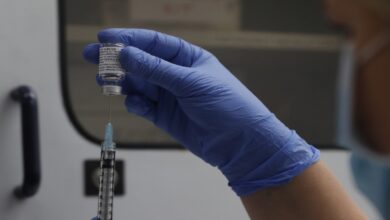11 Potential Delta Variant COVID-19 Symptoms That May Affect You

[ad_1]
- While the Delta variant is triggering a majority of new COVID-19 cases in the United States, it’s unclear if symptoms have adapted entirely from earlier strains just yet.
- There are 11 potential symptoms associated with a COVID-19 infection, but some medical experts suggest that three in particular — cough, fevers and headaches — are exhibiting first for those infected by the Delta variant.
- It’s impossible to determine whether you’ve been impacted by the Delta variant of SARS-CoV-2 until you seek out a COVID-19 test from your healthcare provider.
- The best defense against contracting COVID-19 or having potentially fatal symptoms is vaccination. You can see how to get vaccinated in your state by clicking here.
New COVID-19 infections in the United States are largely being propelled by the highly virulent “Delta” variant of SARS-CoV-2, the virus that spreads the disease throughout the world. Per Centers for Disease Control and Prevention (CDC) data, more than 80% of new infections in the U.S. stem from the Delta strain of the virus, and it’s proven especially deadly for unvaccinated individuals; CDC Director Rochelle Walensky has previously publicly shared that more than 95% of those currently hospitalized with severe COVID-19 infections chose to forego a vaccine.
But the Delta variant also has the ability to impact vaccinated individuals, as the mutated strain can prompt infections that don’t present symptoms (known as “asymptomatic“) or mild cases that can be hard to detect. Because the Delta variant — and all 7 other variants currently recognized by the World Health Organization — acts much differently than the original SARS strain responsible for the pandemic, you may also be wondering if the virus leads to a different kind of sickness altogether.
First thing’s first: While the Delta variant spreads with more ease and may reduce the effectiveness of vaccines in some individuals, it will not cause new symptoms that COVID-19 experts haven’t already identified. Federal health officials, as well as local care providers, are still seeing many infected people exhibit the same illnesses at this point of the pandemic, explains Marisa Montecalvo, M.D., an infectious disease specialist at New York Medical College.
Unvaccinated individuals will still need to consider any sign of sickness as a solid indicator that it’s time to get tested for COVID-19. But it’s understandable that vaccinated individuals may be confused on how to handle symptoms that could be mistaken for a cold or allergies.
What are the symptoms of a Delta variant COVID-19 infection?
The ways in which COVID-19 infections impact your health haven’t changed too much with the viral spread of the Delta variant. There are 11 symptoms in total that have been touted by CDC officials as potential indicators of a COVID-19 infection, which are the same as those prompted by the Delta strain of SARS-CoV-2. But healthcare providers have previously established that a COVID-19 infection can greatly vary between individuals; regardless of whether a sickness is caused by the Delta variant or another strain, individuals may exhibit just one, a couple or a slew of random combinations of the following symptoms.
Here’s the full list of COVID-19 symptoms that are being linked back to Delta strain infections, according to the CDC:
- Cough
- Shortness of breath, and difficulty breathing
- Chronic fatigue
- Fever and widespread chills
- Sore throat
- Congestion and runny nose
- Body aches and pains
- Headaches
- Loss of taste or smell
- Nausea and vomiting
- Diarrhea
Without extensive testing and help from your healthcare provider, it’s impossible to tell if you’re suffering from a COVID-19 infection caused by the Delta variant alone. The symptoms associated with the Delta variant may also apply to an Alpha-based infection or one caused by the burgeoning Lambda strain of the SARS virus. It’s more likely that you are indeed impacted by Delta, however, given its widespread infection rate currently — and the fact that many breakthrough cases (or, infections that impact fully-vaccinated individuals) are being traced back to this particular variant.
This content is imported from Instagram. You may be able to find the same content in another format, or you may be able to find more information, at their web site.
While there isn’t enough data to confirm any connection currently, some experts are touting that the earliest symptoms of a Delta variant infection may differ slightly from previous trends. As healthcare providers within the UC Davis Health system have noted, the Delta variant may cause earlier symptoms that are more in line with a common cold — in particular, coughs, fevers and headaches and a runny nose.
Usually, these cold-like symptoms give way to other telltale signs of SARS-CoV-2 infection — including a loss of smell and taste as well as difficulty breathing. But these early symptoms may make it increasingly difficult for vaccinated individuals to determine if they should seek additional treatment or a COVID-19 test.
A trend of breakthrough illnesses going largely unnoticed and untested — allowing individuals to then spread COVID-19 within communities — has been noted in Europe, particularly in the United Kingdom where the Delta strain has impacted cities for most of 2021, as reported by The Guardian. Even if you’re vaccinated, speaking to your healthcare provider about any cold-like symptoms may prevent you from spreading COVID-19 to others in your home, office, school or community at large if you’ve been affected by a breakthrough infection.
Which symptom is most concerning for Delta variant infections?
It can be extremely confusing and increasingly difficult to try to pinpoint an emerging SARS-CoV-2 infection, but there’s one crucial symptom that should indicate that it’s time to seek immediate medical attention. Unlike other seasonal colds, allergies or respiratory illnesses, the complete loss of taste and smell is unique to COVID-19 — especially for those unlucky enough to be experiencing a breakthrough infection.
“The loss of taste and smell is extremely indicative of a SARS-CoV-2 infection,” Dr. Montecalvo has previously told Good Housekeeping. If you’re unable to taste any food or take in any odors at home, regardless if you’re experiencing any number of other symptoms tied to COVID-19, you should seek out a COVID-19 test immediately and speak with a healthcare provider.
Medical experts are certainly noticing trends when it comes to the spread of the Delta variant and how it impacts SARS infections. But there is no substantiated data to support whether any one symptom or group of symptoms is more common for those impacted by the Delta variant — CDC officials are still working on establishing patterns in breakthrough COVID-19 cases, investigating patients’ sex, underlying conditions and vaccines, among other characteristics.
What to do if you think you’ve been infected by the Delta variant:
Put your mind at ease by seeking out a local testing site near your home, as many remain free of charge to local residents. You can access a full list of federal-backed testing centers in your area using the U.S. Department of Health and Human Services’ directory here.
According to CDC officials, you (or a caregiver) should request immediate emergency medical attention if you have:
- Difficulty breathing or are unable to draw steady breath
- Chronic pain or pressure in your chest or lungs
- Confusion and inability to wake or stay awake
- Skin discoloration in pale, gray or blue hues, particularly on your lips or nail beds
Remember, seeking a COVID-19 test or calling your doctor doesn’t always mean you’ll need to head to a hospital or clinic. If you’re vaccinated, your illness is likely to be milder and not lethal given that vaccines are entirely effective at preventing death — and lower the risk of you requiring hospitalization at any point. More often than not, vaccinated individuals will treat any symptoms while resting at home, while staying isolated away from family, friends, or those in your home to ensure the virus won’t spread.
As more information about the coronavirus pandemic develops, some of the information in this story may have changed since it was last updated. For the most up-to-date information on COVID-19, please visit online resources provided by the CDC, WHO, and your local public health department.
This content is created and maintained by a third party, and imported onto this page to help users provide their email addresses. You may be able to find more information about this and similar content at piano.io
[ad_2]
Source link




